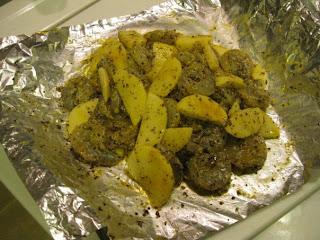One of my favourite comfort food, even after I developed a distaste for the boiled egg white. Pics will follow when I cook this again.
Ingredients:
Eggs--at least four, to make a proper, sizeable dish.
Potatoes--peeled and diced.
Red onions--diced lengthwise.
Ginger--peeled and minced.
Garlic--peeled and pasted (optional)
Tomatoes--chopped (optional)
Mustard oil, though canola/sunflower does too. NOT olive, the flavours conflict.
Jeera (cumin) and dhone (coriander)--preferably bought whole and ground fresh before cooking. I use a pharmaceutical mortar and pestle :-) But shop-bought powders will do too. Just not as well.
Garam masala (small cardamom, clove, cinnamon)--prepped the same way.
Turmeric powder.
Salt, sugar.


Potatoes, peeled and diced. Slices along the egg, all around.

Eggs, rubbed in turmeric and salt and fried in a wok.
How to:
Boil the eggs till the yolks are nice and solid. Should take about fifteen minutes. Leave them in cold water for a few minutes, then shell them under a running tap. This makes shelling easier and minimises damage to the eggs.
Using the tip of a knife, make several shallow lengthwise cuts on each egg. If you forget to do this, the eggs might explode while being cooked.
Rub the incised eggs with a little salt and turmeric powder. Heat mustard oil in a wok. Keep the flame medium-high till the oil turns colourless. Now turn the flame down, otherwise the dish will have a smoky taste that really doesn't go with it.
Add the eggs. Fry them well, till they're more or less evenly browned. This is tough to do on a flat-bottomed pan, hence a wok/korai. Now remove the golden-brown eggs from the wok. Add more oil if required and heat similarly (usually it won't. A well greased wok is good enough for the next step).
Saute the diced potatoes in the oil till they take on a slightly golden tinge all over, indicating a crisp outside. Keep aside.
Heat a little more oil. When it's hot, add the minced ginger. When you smell fried ginger, add garlic (if using) and fry it. Now, add diced onions. Keep the flame low, since a high flame will char the ginger/garlic while frying the onions.
When the onions become transparent, add tomatoes, if using them. Turn the flame up. Keep stirring the mixture to ensure the tomatoes disintegrate completely and are well fried. If not using tomatoes, make a thick paste with cumin powder and a smaller amount of coriander powder with a small amount of water. Add this paste to the onion/ginger/garlic/tomatoe mixture. Now, cook this mixture well till the oil separates out (the process is called kosha/bhuna).
When it does, add the potatoes and briefly fold it in well with the other mixture. Then add water, amount depending on how much gravy you want. Mix the water in well with the rest. Add salt, sugar. Bring to a bubbly boil. Boil for a couple of minutes, stirring gently. Then lower the flame, cover the wok, and let the flavours run into each other.
Lift the lid every few minutes to check if the poatoes are done (a fork should go through it easily). If the gravy seems to be drying out and the curry sticking to the sides of the wok, add more water and stir in gently before covering. When the potatoes seem almost done, add the eggs, stir, and cover again for a few minutes.
The gravy stri-fry is effectively done. But if there's too much gravy still, boil it off. Serve hot with rice, rooti, porotas.

With rice.

Leftovers for 'tiffin' :-)



























